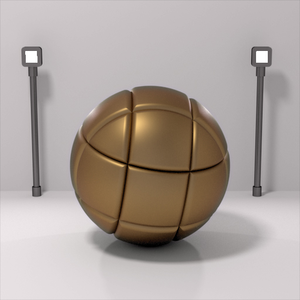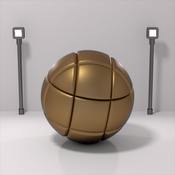Information
- Publication Type: Master Thesis
- Workgroup(s)/Project(s):
- Date: May 2008
- TU Wien Library:
- First Supervisor: Andrea Weidlich
- Keywords: rendering, BRDF
Abstract
Photo realistic rendering of measured data is a widely used method to generate reference images for analytical models. But before we can render measured data it has to be acquired and then fitted and interpolated. In this thesis we review two BRDF (Bidirectional Reflectance Distribution Function) databases from different Universities. One database consists of Spectral data where the other only measured the materials in RGB color space. Furthermore we introduce the reader in the basic BRDF models and in the basics of Monte Carlo sampling methods.We integrate the rendering of measured BRDF data in the Advanced Rendering Toolkit (ART), which is developed since 1996 from the Institute of Computer Graphics and Algorithms of the Vienna University of Technology. Also we evaluate the generated images, with polar plots, to show their reflectance property. Also we show our trilinear interpolation approach, which was used for the data from the Cornell University. To present our work we also rendered several images with the ART pathtracer.
Additional Files and Images
Weblinks
No further information available.BibTeX
@mastersthesis{sari2008mt,
title = "Photorealistic Rendering Of Measured BRDF Data",
author = "Murat Sari",
year = "2008",
abstract = "Photo realistic rendering of measured data is a widely used
method to generate reference images for analytical models.
But before we can render measured data it has to be acquired
and then fitted and interpolated. In this thesis we review
two BRDF (Bidirectional Reflectance Distribution Function)
databases from different Universities. One database consists
of Spectral data where the other only measured the materials
in RGB color space. Furthermore we introduce the reader in
the basic BRDF models and in the basics of Monte Carlo
sampling methods. We integrate the rendering of measured
BRDF data in the Advanced Rendering Toolkit (ART), which is
developed since 1996 from the Institute of Computer
Graphics and Algorithms of the Vienna University of
Technology. Also we evaluate the generated images, with
polar plots, to show their reflectance property. Also we
show our trilinear interpolation approach, which was used
for the data from the Cornell University. To present our
work we also rendered several images with the ART
pathtracer.",
month = may,
address = "Favoritenstrasse 9-11/E193-02, A-1040 Vienna, Austria",
school = "Institute of Computer Graphics and Algorithms, Vienna
University of Technology ",
keywords = "rendering, BRDF",
URL = "https://www.cg.tuwien.ac.at/research/publications/2008/sari2008mt/",
}

 paper
paper
